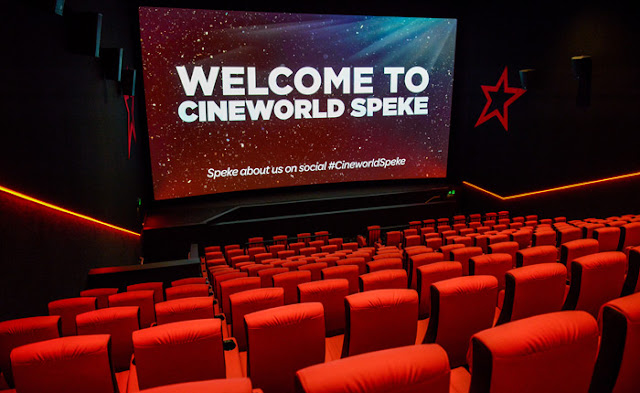AMC and Cineworld's Blacklist of Universal is a Damaging Risk at Best
With Coronavirus already inflicting huge damage on theatrical moviegoing, AMC and Cineworld's blacklist of the studio behind some of the biggest blockbusters of the next few years is reckless at best
 |
| Cineworld Cinemas (CREDIT: Cineworld) |
by Jack Linsdell
We received frankly disturbing news last week that AMC (who owns the Odeon Cinema chain) and now Cineworld are refusing to play any Universal Pictures movies in their cinemas, ultimately blacklisting them. Now, this all started when Universal released Trolls: World Tour onto Premium VOD (PVOD) for a price of $20 (in America) in March/April because theatres had closed due to the Coronavirus lockdown. Whereas most movies (especially the biggest like Mulan, Black Widow and No Time To Die) just postponed their release dates in theatres across the world to latter this year or 2021, Universal made the decision to abandon theatrical release for it's Anna Kendrick/Justin Timberlake musical all together. This made sense, as theatres were closed and kids were stuck at home due to schools being shutdown, so they could still make money by allowing families to buy the movie online and then watch from the comfort of their own homes. Still, the news for Universal got better as the movie has made an estimated $95 million in 19 days of release (about what Trolls made in it's first ten days of domestic release), which led to CEO Jeff Skoll saying that they would play around with the theatrical window of their future releases, and look to more PVOD releases for their smaller movies. This caused outrage amongst cinema chains (like AMC and Cineworld) who are now refusing to play Universal's movies in their theatres - some sources say this will be only for the movies that break the theatrical window, whilst others say it's for all their movies.
Anyway, let me explain why this decision has caused such outrage amongst cinema chains. Typically, every movie released into theatres has a 90 day theatrical window where it can play in cinemas before a studio can release it on VOD or DVD/Blu-ray etc. However, it's usually only the biggest films/blockbusters that play for the entirety of the theatrical window (due to being the most popular and/or appealing to the masses the most), with the smaller and mid-budgeted flicks ending their cinema runs by weekend six at the latest. Considering these smaller movies are playing to emptier auditoriums now anyway (because of the whole "less people go to the movies just to go to the movies" thing, and the rise in streaming services like Netflix), it's understandable why Universal and other studios would want to release those films earlier onto VOD and the like to maximise profits. So, I can certainly understand and sympathise with the studios for wanting to play around with the theatrical window, because unless your a Marvel, DC or Star Wars flick, you're kind of doomed in this day and age.
On the other hand, with coronavirus only amplifying the effects of Netflix and Disney Plus on the cinema chains, and with an uncertain future (will people visit cinemas in numbers they did even before coronavirus started spreading after the lockdown is eased?), I do also sympathise with AMC and Cineworld, because theatrical moviegoing has been shrinking rapidly ever since 2014 really. However, that said, Universal is the studio behind some of the biggest blockbusters of the next few years. This year they had Fast & Furious 9 (which has moved to early 2021), Illuminations much-loved Minions 2: The Rise of Gru and the international distribution of Daniel Craig's final James Bond outing No Time To Die. Let's not forget the dinosaur threequel Jurassic World Dominion and Fast & Furious 10 coming in 2022. These films are all sequels to films that grossed $1 billion worldwide, and most of them were expected to achieve that same milestone too. Now, considering AMC were $5 billion in debt before this whole pandemic kicked off, this blacklist play seems like a very damaging risk and/or bluff at best, and financial suicide at worst. I get the point they are trying to make, but the truth is that AMC and Cineworld can't afford to not play Universal films considering that they are releasing some of the biggest (and most money making) movies of the next few years. Considering profits are normally split 50/50 between chains and studios, this seems like a silly and reckless play.
Let's not forget that Universal was only talking about releasing smaller movies (which had already bombed, or were about to end their theatrical run after 21 days) on PVOD earlier, because they can't afford to do the same with $150-300 million budgeted blockbusters that need leggy and long theatrical runs to make profit. And, after this lockdown eases, cinemas are going to struggle with getting even the numbers of people back into their auditoriums as they did before this all kicked off, so refusing to play the biggest movies that are the only things audiences would come to the cinema for in the first place, seems ridiculous. It's not just AMC and Cineworld that would be affected, as the whole theatrical moviegoing sector will be hugely impacted just at the time it's already hanging by a thread. When audiences only turn up for Thor Ragnarok but ignore Late Night, then choosing not to play Thor Ragnarok in your theatres sounds crazy.
So, here's hoping that Universal and AMC can work this one out. Because, one thing's for sure, when this lockdown ends, the one thing Hollywood needs to do is come together. If theatrical moviemaking is going to continue surviving, especially as Coronavirus (as well as shutting down cinemas) has only increased and ever growing demand and use of streaming services, then blacklisting some of the biggest movies from theatres - which make up 95% of a consumers theatrical intake - seems counter-productive. And, for those like me who have fan-favourite movies coming out this year which Universal is distributing (No Time To Die and Paul Greengrass's News Of The World), then this news is even more worrying.


Comments
Post a Comment